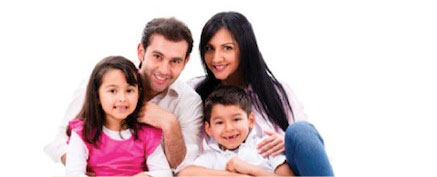Does your conflict look like this?
- Do you and your partner/ ex-partner seem to be stuck in a cycle of disagreement, arguing, and fighting that leaves you feeling resentful, angry, frustrated, afraid and helpless?
- Are your children stuck in the middle of the fighting or are they aware of the fighting?
- Are you and your partner/ex-partner unable to communicate or interact with each other in a respectful manner?
- Is conflict between you and your partner/ex-partner affecting your ability to parent in a healthy way?
What is high conflict?
High conflict is conflict that is severe, frequent and ongoing. It can take many forms which may include physical altercations, emotional and verbal aggression, manipulation and/or extended times of non-communication. Through the Caring Families program, you will be able to learn how to differentiate between “healthy” conflict that is a normal part of any relationship and high parental conflict that threatens the wellbeing of all family members, particularly the children.
How parental conflict affects children
Inter-parental conflict has a significant impact on children’s development affecting a child’s physical, social and emotional wellbeing. Researchers consistently report that children exposed to abusive parental conflict are at risk of experiencing stress reactions and may experience increased emotional and behavioural difficulties (Baker, Jaffe & Ashbourne 2002; Carlson, 2000; Kitzmann, Gaylord, Holt & Kenny, 2003; Holt, Buckley and Whelan, 2008). In 2011, the Office of Attorney General of California Department of Justice released a video explaining how exposure to trauma and violence impacts a child’s developing brain and it’s long term implications for the child.
https://www.youtube.com/watch?v=brVOYtNMmKk
References
Baker L. L., Jaffe P. G., Ashbourne L. (2002). Children Exposed to Domestic Violence: An Early Childhood Educator’s Handbook to Increase understanding and Improve Community Responses. Handbook produced by the Centre for Children & Families in the Justice System, 254 Pall Mall St., Suite 200, London, On N6A 5P6
Carlson, B. E. (2000). Children exposed to intimate partner violence: Research findings and implications for intervention. Trauma Violence and Abuse, 1, 321-342
Kitzmann, K. M., Gaylord, N. K., Holt, A. R., and Kenny, E. D. (2003). Child Witnesses to Domestic Violence: A Meta-Analytic Review. Journal of Consulting and Clinical
Psychology. 71(2), 339–352.
Holt, S., Buckleyb, H. and Whelana, S. (2008). The impact of exposure to domestic violence on children and young people: A review of the literature. Child Abuse & Neglect, 32, pp. 797-810. doi:10.1016/j.chiabu.2008.02.004


